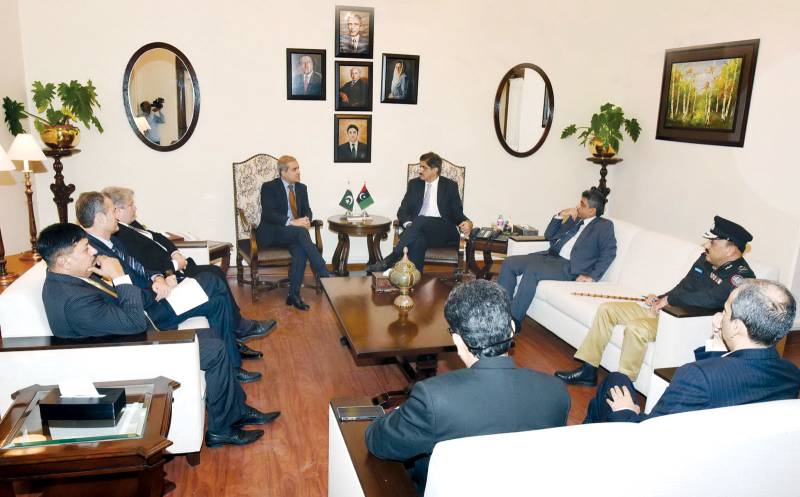KARACHI- Sindh Chief Minister Syed Murad Ali Shah has said that Sindh has been hosting Afghan refugees, registered and unregistered; both for the last 37 years, but now their repatriation should be expedited.
Talking to United Nations High Commissioner for Refugees Indrika Ratwattee, who met him along with his delegation here at the CM House on Thursday, the chief minister said a large number of Afghan refugees had settled in Sindh, particularly in Karachi and its adjoining areas, during the last 37 years.
“Sindh government is hosting them with an open heart and spending a big chunk of its resources, meant for original inhabitants of the province, on them,” he added.
At the same time, he made it clear that the province had been facing worst law and order situation for the last many years.
“Now although the situation has improved after targeted operations and other drastic measures, still it is a decision of the Apex Committee, the highest forum to implement the National Action Plan (NAP) in the province, to repatriate all illegal immigrants, including Afghans.
The delegation members included UNHCR Deputy Chief Yua, Chief Commissioner for Afghan Refugees Imran Zaib, Deputy Representative of UNHCR Johann Siffointe,
Head of UNHC Field office Karachi Younis Sahibzada and Commissioner Afghan Refugees Ghazanfar Ali Agha
The chief minister was assisted by Sindh Police IG AD Khawaja, Principal Secretary Naveed Kamran Baloch and Home Secretary Shakeel Mangnijo.
The CM further said that the federal government had been approached to expedite repatriation of these refugees, but the latter delayed the process for six months (end of Dec 2016) on the request of UNHCR.
Murad urged the UNHCR to take necessary measures and make arrangements to repatriate them so that provincial government could move forward in implementing the decisions taken in the Apex Committee meetings.
When Head of the delegation Indrika Ratwatee said that there were around 600,000 Afghan refugees in Pakistan, of whom around 1.3 million were in Sindh, the CM did not agree with him, and said, “The repatriation is in progress and everyday around 2,000 Afghan nationals return to their homeland.”
He told Ratwatee that KP was the only province from where 350,000 Afghan nationals had returned to Afghanistan so far, while Punjab came second, which had repatriated a good number of refugees.
“However, from Sindh only 32,000 Afghans have gone back to Afghanistan,” he reminded the visitors.
Giving details of the repatriation of large number of refugees from Khyber Pakhtunkwa, the UNHCR chief said that they usually remained in touch with their people back in Afghanistan. “Moreover, they are close to their country from there,” he said, and added, “As far as Sindh is concerned, Karachi has vast employment opportunities and the refugees are far away from their country’s border. Therefore they are reluctant to return home.”
The chief minister said that there were a large number of unregistered Afghan nationals in Sindh too.
He urged the UNHCR to get them registered so that the Sindh government could know who was who and where he lived.
“We spend on their food {subsidy}. They are using our utilities and even their children are receiving education in our government schools,” he said, and added that being host Sindh has taken proper care of the Afghan nationals. “But in return, our people have suffered a lot in the shape of terrorism – you know well and I don’t want to go into details,” he complained. The UNHCR chief said that the Commission had allocated $175 million for the education and health of the refugees, out of the sanctioned amount of $30 million.
“You can spend this amount on the education, health and other social services of the Afghan refugees living in your province,” he suggested.
The CM, on the occasion, directed the home secretary to coordinate with UNHCR for the registration of all Afghans living in the province, and with their support and coordination make arrangements to repatriate them.
Graffiti of banned outfits reappear
Meanwhile, graffiti of proscribed militant outfits, including Tehreek-e-Taliban Pakistan (TTP), have begun to reappear in Mangopir in District West, once considered their stronghold, putting a question mark over the tall claims made by security agencies tall claims.
According to details, wall chalking in support of Taliban has reappeared in various parts of District West, particularly in Mangopir.
The reappearance of graffiti points towards the existence of militants in the localities that the law-enforcement agencies have claimed to have cleared during the Karachi operation continuing for the last three years.
Mangopir, Sultanabad, Pukhtoonabad and adjacent localities of district west were dominated by Pushtoons and the areas were under complete influence of the militant organisations from 2007 to 2013. Wall chalking suggests the existence of groups like Khalid Sajna group in the areas.
Some of the graffiti go like this: “Taliban remains active and watching everyone.” It has been learnt that wall chalking has created panic among the residents, while the security agencies are looking into the matter from different angles.
However, as per claim by some police officials, some former colleagues of theirs were behind wall chalking, and they wanted to create an impression that situation in the area was fragile so that they could achieve their nefarious goals.






